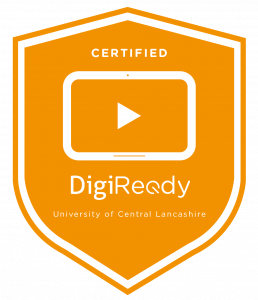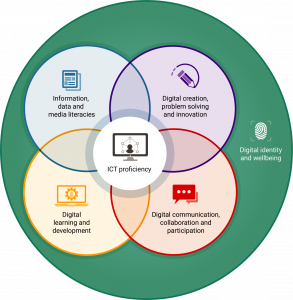 Chris is a Learning Technologist, working directly with UCLan’s Faculty of Health and Wellbeing as digital lead. Currently an MIE Expert, MIE Trainer and Microsoft Certified Educator – Chris is an active member of the Microsoft community, regularly contributing and advocating the use of technology solutions in education. He played a key role in the deployment and development of Microsoft Surface technology across the University’s academic community. Chris is currently leading on a new initiative, which recognises the development of 21st century, digital skills to support students in their future employment. He is also an active member of the Association for Learning Technology (ALT) and holds Fellowship with the Higher Education Academy (HEA).
Chris is a Learning Technologist, working directly with UCLan’s Faculty of Health and Wellbeing as digital lead. Currently an MIE Expert, MIE Trainer and Microsoft Certified Educator – Chris is an active member of the Microsoft community, regularly contributing and advocating the use of technology solutions in education. He played a key role in the deployment and development of Microsoft Surface technology across the University’s academic community. Chris is currently leading on a new initiative, which recognises the development of 21st century, digital skills to support students in their future employment. He is also an active member of the Association for Learning Technology (ALT) and holds Fellowship with the Higher Education Academy (HEA).
Picture by Chris Bull for Association For Learning Technology 13/9/18.
ALTC 2018 day three. www.chrisbullphotographer.com
DigiReady: Equipping our students for the modern workplace
 It has never been more important to prepare our students for the modern workplace by equipping them with future facing, digital skills. Following the Jisc Digital experience insights survey 2018, it was found that only 41% of students who were asked felt that their course of study ‘prepared them for the digital workplace’. In addition, only 40% agreed that they had regular opportunities to ‘review and update their digital skills’. At the University of Central Lancashire, the Technology Enabled Learning and Teaching (TELT) team have worked closely with our academic community to address these ever-growing concerns.
It has never been more important to prepare our students for the modern workplace by equipping them with future facing, digital skills. Following the Jisc Digital experience insights survey 2018, it was found that only 41% of students who were asked felt that their course of study ‘prepared them for the digital workplace’. In addition, only 40% agreed that they had regular opportunities to ‘review and update their digital skills’. At the University of Central Lancashire, the Technology Enabled Learning and Teaching (TELT) team have worked closely with our academic community to address these ever-growing concerns.
 “The 21st century demands ‘21st century skills’. Our students are embarking on career paths which are invariably changing at a rapid pace, particularly in relation to technology. Many of our students are aspiring to become teachers of Physical Education and being ‘digitally literate’ is a crucial prerequisite of employability in this domain.”
“The 21st century demands ‘21st century skills’. Our students are embarking on career paths which are invariably changing at a rapid pace, particularly in relation to technology. Many of our students are aspiring to become teachers of Physical Education and being ‘digitally literate’ is a crucial prerequisite of employability in this domain.”
Andrew Sprake – Lecturer in Physical Education
Jess Macbeth – Senior Lecturer in Sport Studies
It was identified across several disciplines that students were already demonstrating a number of digital skills, often without realising themselves and normally without any kind of formal recognition which could aid their future employability.
 “At UCLan, the midwifery curriculum prides itself on allowing students to develop digital literacy skills and encouraging them to be ‘digitally ready’ when seeking employment. With employers often stating that digital skills are an essential requirement for those applying for the role of a newly qualified midwife, the team see this as an essential component of the midwifery course. Lecturers lead by example, by ensuring that all teaching and learning resources are delivered using digital approaches, encouraging the students to engage with these methods of learning.”
“At UCLan, the midwifery curriculum prides itself on allowing students to develop digital literacy skills and encouraging them to be ‘digitally ready’ when seeking employment. With employers often stating that digital skills are an essential requirement for those applying for the role of a newly qualified midwife, the team see this as an essential component of the midwifery course. Lecturers lead by example, by ensuring that all teaching and learning resources are delivered using digital approaches, encouraging the students to engage with these methods of learning.”
Neesha Ridley – Senior Lecturer in Midwifery
Our approach was to look at developing ‘DigiReady’, a new student certification underpinned by the Jisc digital capabilities framework (image above) and adapted from a more recent Microsoft tool. Implemented at course level, it centres around eight core skills ranging from effective communication, to online safety/security and profile management.
Students build up their evidence of skill development across these areas, which they record into an e-portfolio using OneNote Class Notebook. Evidence can consist of annotated screenshots, audio/video reflections, and sometimes involves different participation in interactive activities. The e-portfolio provides tutors with instant access to each individual student space, where they can monitor progress and provide valuable feedback along the way. Students are also asked to build a short presentation or video answering three reflective questions, which draw on evidence from their portfolio and overall DigiReady journey and development. This final digital artefact aims to provide a valuable resource that will support students in their future employability.
 Jean Duckworth and Hazel Partington – both academics at the University, lead a suite of online Masters level courses and modules. Students arrive to the course or module with a range of different digital skill levels. Some may have studied or worked in a technology rich environment, whilst others have not yet developed their skills in this area. The team start the course with a very intensive induction, which starts with using Outlook, Microsoft Teams, Skype, Adobe Connect and the University’s Virtual Learning Environment. By doing this, students get to know each other and have the tools to fully engage in their studies. These skills are further developed as a student progresses through the course or module.
Jean Duckworth and Hazel Partington – both academics at the University, lead a suite of online Masters level courses and modules. Students arrive to the course or module with a range of different digital skill levels. Some may have studied or worked in a technology rich environment, whilst others have not yet developed their skills in this area. The team start the course with a very intensive induction, which starts with using Outlook, Microsoft Teams, Skype, Adobe Connect and the University’s Virtual Learning Environment. By doing this, students get to know each other and have the tools to fully engage in their studies. These skills are further developed as a student progresses through the course or module.
While the initiative is still in an early pilot phase that will inform its future development, we know it will play a crucial role in the digital development of our students.
 “Employers often comment how ‘digitally ready’ students from our University are when they apply for jobs. By encouraging students to embrace and develop digital literacy, we are equipping them with lifelong skills that they will use throughout their careers, so they are confident and competent to provide care using digital systems in the work place.”
“Employers often comment how ‘digitally ready’ students from our University are when they apply for jobs. By encouraging students to embrace and develop digital literacy, we are equipping them with lifelong skills that they will use throughout their careers, so they are confident and competent to provide care using digital systems in the work place.”
Neesha Ridley – Senior Lecturer in Midwifery
“We expect the introduction of the DigiReady programme will showcase the development of important 21st century skills to employers, stakeholders or course providers.”
Hazel Partington & Jean Duckworth – Senior Lecturers in the Faculty of Health and Wellbeing
“Initial feedback from the pilot programme has been overwhelmingly positive and will inevitably set our students apart.”
Andrew Sprake – Lecturer in Physical Education
Jess Macbeth – Senior Lecturer in Sport Studies
